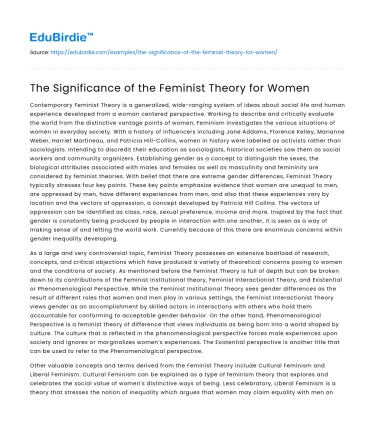Contemporary Feminist Theory is a generalized, wide-ranging system of ideas about social life and human experience developed from a woman centered perspective. Working to describe and critically evaluate the world from the distinctive vantage points of women, Feminism investigates the various situations of women in everyday society. With a history of influencers including Jane Addams, Florence Kelley, Marianne Weber, Harriet Martineau, and Patricia Hill-Collins, women in history were labelled as activists rather than sociologists. Intending to discredit their education as sociologists, historical societies saw them as social workers and community organizers. Establishing gender as a concept to distinguish the sexes, the biological attributes associated with males and females as well as masculinity and femininity are considered by feminist theories. With belief that there are extreme gender differences, Feminist Theory typically stresses four key points. These key points emphasize evidence that women are unequal to men, are oppressed by men, have different experiences from men, and also that these experiences vary by location and the vectors of oppression, a concept developed by Patricia Hill Collins. The vectors of oppression can be identified as class, race, sexual preference, income and more. Inspired by the fact that gender is constantly being produced by people in interaction with one another, it is seen as a way of making sense of and letting the world work. Currently because of this there are enormous concerns within gender inequality developing.
As a large and very controversial topic, Feminist Theory possesses an extensive boatload of research, concepts, and critical objections which have produced a variety of theoretical concerns posing to women and the conditions of society. As mentioned before the Feminist Theory is full of depth but can be broken down to its contributions of the Feminist Institutional theory, Feminist Interactionist Theory, and Existential or Phenomenological Perspective. While the Feminist Institutional Theory sees gender differences as the result of different roles that women and men play in various settings, the Feminist Interactionist Theory views gender as an accomplishment by skilled actors in interactions with others who hold them accountable for conforming to acceptable gender behavior. On the other hand, Phenomenological Perspective is a feminist theory of difference that views individuals as being born into a world shaped by culture. The culture that is reflected in the phenomenological perspective forces male experiences upon society and ignores or marginalizes women’s experiences. The Existential perspective is another title that can be used to refer to the Phenomenological perspective.
Save your time!
We can take care of your essay
- Proper editing and formatting
- Free revision, title page, and bibliography
- Flexible prices and money-back guarantee
Other valuable concepts and terms derived from the Feminist Theory include Cultural Feminism and Liberal Feminism. Cultural Feminism can be explained as a type of feminism theory that explores and celebrates the social value of women’s distinctive ways of being. Less celebratory, Liberal Feminism is a theory that stresses the notion of inequality which argues that women may claim equality with men on the basis of an essential human capacity for reasoned moral agency. Liberal Feminism also serves to prove a point that gender inequality has become the aftermath of a patriarchal and sexist patterning of the division of labor. In order to put an end to a system like such, feminists have encouraged women in society to begin transforming the division of labor through the repatterning of necessary institutions such as family, politics with law, work, education, and within the media.
Finally, the Feminist Theory works to give power and a voice to women in society, who as a population have faced inequality and mistreatment. Crucial objectives within the Feminist Theory utilize the Standpoint Theory and emphasize the concept that in order to understand a woman, that information and insight must be sought from a woman.






 Stuck on your essay?
Stuck on your essay?

